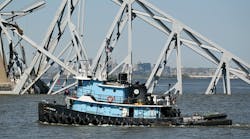Landscapers need willing hands and tough trucks
Mark Levy is not what you'd call a typical fleet manager. For starters, he has a degree in horticulture from the University of Florida. This means he's more likely to know the difference between Kentucky Bluegrass and tri-dwarf blend fescue than between different brands of engines, transmissions, etc.
Yet trucks are a critical component of his business. Without them, he'd be unable to find work in his chosen field - landscaping.
Levy is the president of Mark D. Levy Horticultural Services, serving Westchester County, N.Y., and Fairfield County, Conn. Using nothing but a personal credit card, he and his wife started the business 10 years ago. The company, which handles commercial and residential landscaping projects, now employs 25-30 people and operates a fleet of seven Mitsubishi Fuso trucks.
Landscaping projects involve fertilizing and mulching lawns, trimming trees and bushes, cultivating flowers, building and maintaining ponds and lakes, even installing irrigation systems. In addition, Levy's trucks see some pretty heavy-duty work during the winter months, when they double as snowplows.
It's a $14-billion industry that relies on a variety of trucks - from light-duty pickups to heavy-duty dump trucks - to get the job done.
Yet as a career, landscaping is relatively new - one that didn't really exist when David Mazanowski graduated from the University of Indiana in 1981. Mazanowski will tell you that he didn't go to college to learn how to cut grass for a living. Yet he and his brother Vic were reluctant to walk away from the small landscaping business they had created to earn extra money for college.
"At that time, the landscape industry was still in its 'embryonic' stage, so to speak," he explains. "Much of the grounds maintenance service for office buildings and corporate headquarters remained in-house, so full-service landscaping was still in its infancy. Besides, at that time I didn't think much about cutting grass for a living."
What a difference two decades can make. From such humble beginnings, the Mazanowski brothers built Mainscapes Corp., established in Indianapolis in 1985, into a $7-million-a-year business.
Winter worries Since landscaping is such a seasonal business, companies like Mainscapes are forced to take an entirely different approach when winter arrives. "We peak at 230 employees in the spring and summer, but that drops to 60 when winter comes," Mazanowski says. "Our off-season runs from December to February, so we use snowplowing to supplement our income stream. Our commercial customers started asking for snowplowing services in the late 1980s as part of their full-scale landscaping contracts."
Mainscapes operates a fleet of 50 light-duty pickups - 3/4 ton, 4WD Chevrolets and Fords - along with six dump trucks used to haul dirt, fertilizer and other commodities in the summer and salt-spreaders in the winter.
"We don't use the dump trucks as plows - they just spread salt," said Mazanowski. "The pickups are all equipped with snowplows and do the bulk of the plowing work." Mainscapes does have six John Deere backhoe loaders in its fleet that get called into action for big snow removal jobs.
Mazanowski's trucks are equipped with the Boss brand Power-V multi-position snowplow. The plow can be positioned four different ways - scoop, 'V', straight or angled - depending on the space requirements. The versatility of the plows has allowed Mainscapes to get snow removal contracts at some 200 sites within a 50-mi. radius of downtown Indianapolis.
Yet even Mainscapes can get overwhelmed during major blizzards so the company relies on subcontractors to handle severe storms. And a snowstorm can pay off handsomely for the company. "A good storm can provide a quarter of our revenue in just a few days," adds Mazanowski.
Even with the added revenue from its snow removal contracts, however, buying and maintaining equipment remains an expensive proposition for Mainscapes. "It costs us $500,000 a year in terms of mechanic salaries, materials and garage upkeep," said Mazanowski.
To cut fleet operating costs, Mainscapes is looking to outsource some of its vehicle maintenance. But according to Mazanowski, "We never envision not having a full-time mechanic on staff; an in-house maintenance staff gives us a nice bit of flexibility."
The company is also thinking about leasing most of its trucks and equipment. "We used to buy all of our trucks and keep them 10 to 15 years," he says. "Now we lease them and turn them over every five years. We even lease our lawn mowing equipment, turning that over every two to three years."
Lower cost is obviously the major reason for leasing. "By financing all of our equipment, we established a fixed cost for it. It's easier for us to budget," Mazanowski explains. But image also plays a role. "How we 'look' out in public is important. Having newer equipment gives us that better image - and we get less downtime in the bargain."
Mainscapes still buys its trailers, but is making changes to them as well. "We originally started with 33-ft. low-profile horse trailers modified to carry lawn equipment," Mazanowski says. "However, they were expensive, heavy and hard on our trucks. Now we're considering lighter trailers. We're experimenting with flatbeds, but that means the equipment is right out in the open, compromising our 'clean' image. So we're also looking at enclosed trailer models."
Labor issues Finding good workers remains one the biggest challenges facing landscapers, Mazanowski says. "We have a mobile work force, so I can't just look out the window and see how they're doing. They're spread out among many sites and left to work on their own."
Mainscapes' goal is to generate $35 a person-hour to stay profitable, so it uses incentive-based pay to get the best from its workers. "We hire employees knowing we have to provide them with a sense of ownership and opportunity so they'll give us their very best," he says. "We put a lot of time and money into training them, and provide incentive pay so we can keep them with us for the long haul."
Mazanowski wouldn't trade his job for any other. He points out that while it's nice to work outside, you're still running a business. "You need to establish relationships with customers, develop a reputation for honesty, good work and value. But I really enjoy it."
However, Mazanowski does believe the pressure is a little higher on landscapers because their work remains out in the open for everyone to see. "Dealing with the environment is a highly visible line of work. You always need to do a good job."


